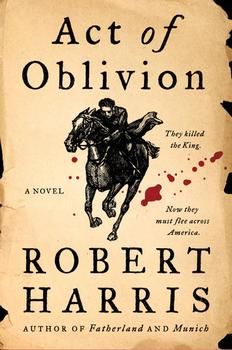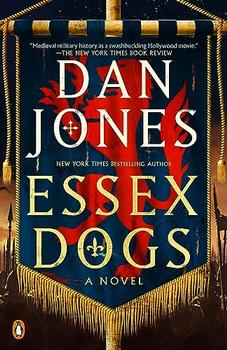Summary | Excerpt | Reviews | Beyond the book | Read-Alikes | Genres & Themes | Author Bio

A Novel
by Robert HarrisSet during the English Restoration, Robert Harris's historical novel Act of Oblivion takes us on a whirlwind journey involving London and the American colonies, as well as people on both sides of the English Civil War. Harris switches the point of view on almost a chapter-by-chapter basis between the story's "protagonists" and "antagonist" — though as readers learn more about the histories these characters share, they may find it more difficult to paint things in such black-and-white terms.
Act of Oblivion is a classic cat-and-mouse story, with the fictional manhunter Richard Nayler pursuing his prey, the historical figures Colonel Edward Whalley and Colonel William Goffe, for decades. Nayler works for the Privy Council of King Charles II after the monarchy has been restored to power (that's where the Restoration period gets its name). The king's father, Charles I, was executed in 1649 (see Beyond the Book) after a bloody Civil War fought between the Royalists and the Parliamentarians. Oliver Cromwell, the leader of the Parliamentarians, became the Lord Protector of the Commonwealth and ruled for five years before his death. His son, ill-equipped to inherit his father's role, left a power vacuum that resulted in Parliament inviting Charles II back from exile to rule.
This is where Act of Oblivion begins, at a key moment in the turbulent history of 17th-century England. Those who were touted as heroes during Cromwell's rule for defeating the Royalists — and signing the death warrant for King Charles I — are suddenly seen as treasonous murderers. Two of those men are Edward Whalley and William Goffe. While the majority of their compatriots have either died of natural causes or been apprehended by the Royalist government already — and then suffered a torturous public execution by drawing and quartering — Whalley and his son-in-law Goffe manage to escape to America. The rest of the novel details their decades on the run from Nayler, their dogged pursuer, whose personal history with the two colonels motivates him to follow them to the ends of the earth.
Harris's choice to switch points of view between the colonels and Nayler works well for several reasons and gives the book its unique, humanizing flair. The technique allows him to make full use of both England and the American colonies as settings; between the multiple storylines, it is practically impossible for readers to get bored or guess what is coming next. During the London chapters, Harris adds another narrator — Frances Goffe, Whalley's daughter and William Goffe's wife. The author gives full access to the inner thoughts of all these characters, painting a fuller picture of the plot and people involved. This is the main advantage of Harris's approach: The story is all about the two sides of a war and the ways people on each side justify their actions. Beyond heinous acts of wartime violence, all of the male narrators also engage in torture and murder during supposed peacetime. Yet Harris depicts even scenes of violence with a poetic description that makes reading Act of Oblivion like watching a movie; everything springs from the page to the imagination.
Harris's powerful writing makes it hard not to empathize with every one of the narrators. War — and its long lasting aftermath — warps people into awful versions of themselves, very often through no fault of their own. The grudges and obsessive beliefs of the characters in Act of Oblivion inform every move they make, and readers will be on the edge of their seats as they follow them from London to Massachusetts and beyond.
![]() This review was originally published in The BookBrowse Review in November 2022, and has been updated for the
October 2023 edition.
Click here to go to this issue.
This review was originally published in The BookBrowse Review in November 2022, and has been updated for the
October 2023 edition.
Click here to go to this issue.

If you liked Act of Oblivion, try these:

by Lev Grossman
Published 2025
The #1 New York Times bestselling author of the Magicians trilogy returns with a triumphant reimagining of the King Arthur legend for the new millennium.

by Dan Jones
Published 2023
The New York Times bestselling historian makes his historical fiction debut with an explosive novel set during the Hundred Years' War.
Your guide toexceptional books
BookBrowse seeks out and recommends the best in contemporary fiction and nonfiction—books that not only engage and entertain but also deepen our understanding of ourselves and the world around us.